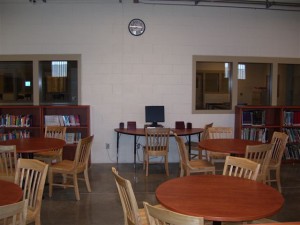Reflections from WSP Library, July 2013

My job in the Washington State Library Branch at the Washington State Penitentiary has exposed me to an area of librarianship I never would have thought I was suited for. When I started at the penitentiary library I was green as they say but over the last five years I’ve learned a lot about how to provide library resources to a unique population of individuals. The inmates are from many situations in their lives and those who take advantage of coming to the library will tell you some of their situation in words, attitudes, and how they present themselves away from the confines of life in a prison cell.
The younger ones, teenagers some of them, who have only experienced street life or lack of parent involvement come in to see other inmates but also are learning that what they can get from reading a magazine or newspaper, even a book, can help them see another way to go in their life choices.
Older men who come know the value of having something to entertain and motivate them to get out of the cell environment for a while. They look for novels, westerns, books in history, philosophy, religion. One inmate has asked for books on mindfulness and awareness of spirituality which he said might help him find meaning to his life.
A lot of patrons thank me in various ways for helping them find a book or providing information from the internet that answers a question or fulfills an interest on a subject they want to know more about. One request for an explanation of the longitude and latitude of the world found in the encyclopedia was just what he wanted to know. Another request for speeches by famous people resulted in the inmate confiding that he was spending his time learning to recite the important words written by Americans throughout history.
By far the most surprising encounter I have had is with a small Korean man who comes to find instruction books in learning English. When I talk to him, he understands a lot, but speaking is hard for him. But, the best communication we have each time he comes in is silent but effective. If I catch sight of him coming in the door I might acknowledge him with a wave or nod my head. But every time, he stops, and bows to me. I suppose that is a common action in his culture on the other side of the world, but to experience it in a small library in Eastern Washington placed in a prison says more than any words of appreciation that could be spoken.
More importantly what I learn and appreciate from talking and helping has opened a new world view to me.